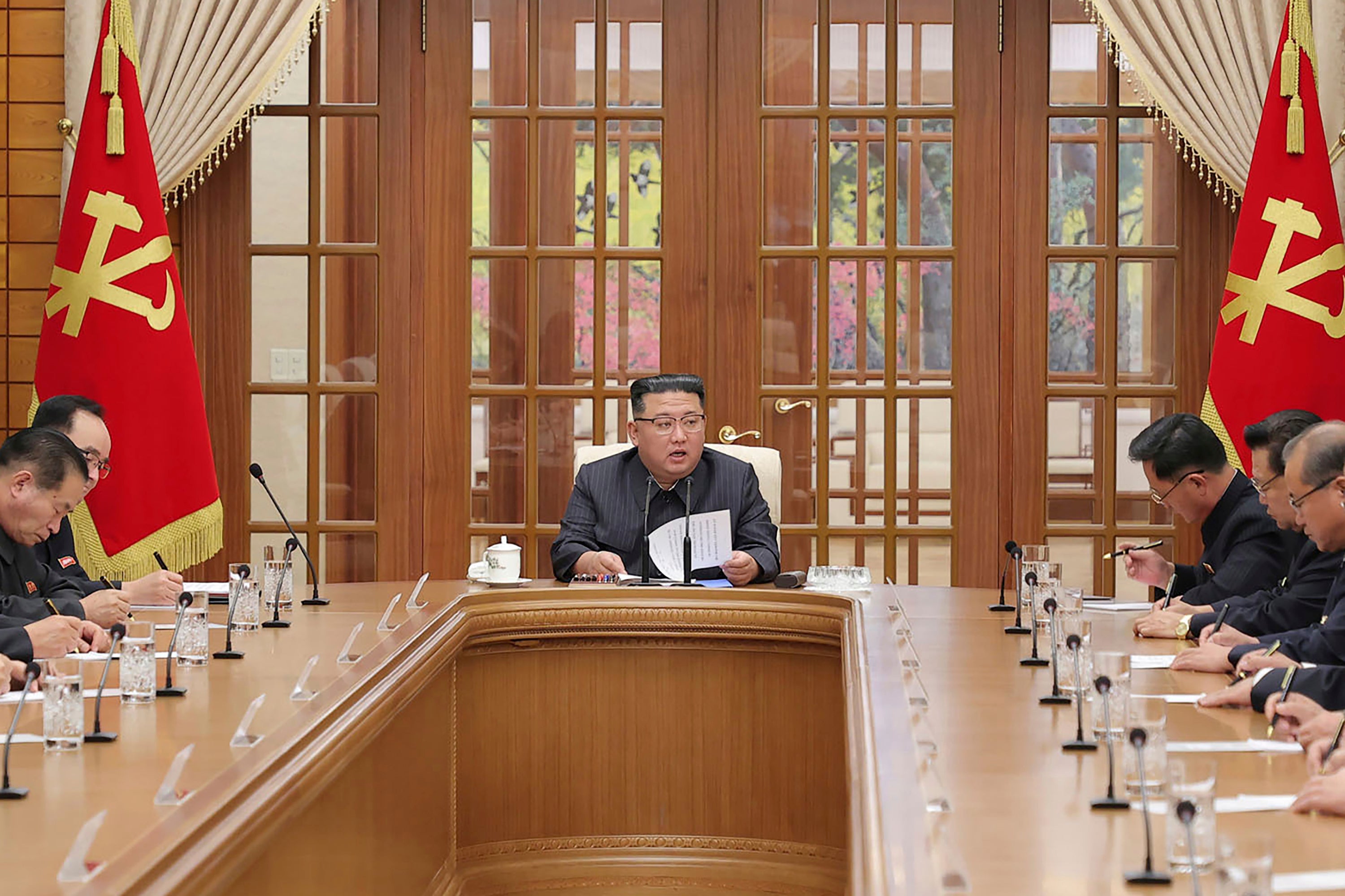North Korea's Kim calls for meeting to review state affairs
North Korean leader Kim Jong Un has called for a major political conference before the end of the year to talk about key state affairs, where he’s expected to address his increasingly tense relations with Washington and Seoul over the expansion of his nuclear and missile programs

Your support helps us to tell the story
From reproductive rights to climate change to Big Tech, The Independent is on the ground when the story is developing. Whether it's investigating the financials of Elon Musk's pro-Trump PAC or producing our latest documentary, 'The A Word', which shines a light on the American women fighting for reproductive rights, we know how important it is to parse out the facts from the messaging.
At such a critical moment in US history, we need reporters on the ground. Your donation allows us to keep sending journalists to speak to both sides of the story.
The Independent is trusted by Americans across the entire political spectrum. And unlike many other quality news outlets, we choose not to lock Americans out of our reporting and analysis with paywalls. We believe quality journalism should be available to everyone, paid for by those who can afford it.
Your support makes all the difference.North Korean leader Kim Jong Un called for a major political conference before year's end where he's expected to address his increasingly tense relations with Washington and Seoul over the expansion of his nuclear and missile programs.
North Korea’s state media said Thursday that Kim presided over a meeting of the ruling Workers’ Party’s Politburo in which members reviewed the implementation of state policies in 2022 and decided to hold a larger plenary meeting of the party’s Central Committee at an unspecified time in late December.
Kim in recent years has used political conferences in late December or early January to review state affairs and reveal his most important goals in economic and foreign policy and arms development. It’s possible that those meetings are replacing the function of Kim’s New Year’s Day speeches, which he has skipped since 2020 after using them for years to issue major announcements.
During Wednesday’s meeting in capital Pyongyang, Kim insisted that the country this year overcame “unprecedented adversity” in both internal and external circumstances to achieve progress in national development and elevate the country’s “prestige and honor,” the Korean Central News Agency said.
North Korea has ramped up missile testing to a record pace this year, exploiting a divide in the United Nations Security Council worsened by Russia’s war on Ukraine to speed up weapons development and dial up pressure on Washington and Seoul.
But Kim has also been struggling to improve a dysfunctional and heavily sanctioned economy made worse by pandemic border closures in recent years, an issue he may also address during the year-end meeting.
State media reports of Kim’s comments during Wednesday’s Politburo meeting did not include specific details of what would be discussed in the party plenary. They also did not mention any critical remarks toward Washington or Seoul.
The KCNA said Kim described 2023 as a crucial year for accomplishing the goals set under a five-year plan established during a ruling party congress in January 2021, where he vowed to revamp his economy and also bolster his nuclear deterrent in the face of U.S.-led sanctions and pressure. During that congress, Kim issued a long wish list of sophisticated weaponry, including more powerful intercontinental ballistic missiles, hypersonic weapons, nuclear-powered submarines, spy satellites and tactical nuclear arms.
Noting that 2023 is a “historic year” — marking the 75th anniversary of North Korea’s founding and the 70th anniversary of the end of the 1950-53 Korean War — Kim said a “decisive guarantee for the fulfillment of the five-year plan” should be laid out for the coming year, according to the KCNA.
The dozens of North Korean missile tests conducted this year have included multiple launches of ICBMs with potential range to reach the U.S. mainland and an intermediate-range missile flown over Japan. The North has also conducted a barrage of short-range launches it described as simulated nuclear attacks on South Korean and U.S. targets as it angrily reacted to the expansion of the allies’ combined military exercises, which the North insists are rehearsals for a potential invasion.
North Korea has punctuated its tests with threats of nuclear conflict with Washington and Seoul that communicated an escalatory nuclear doctrine. Pyongyang’s rubber-stamp parliament in September passed a law that authorized preemptive nuclear attacks over a broad range of scenarios, including non-war situations, where it may perceive its leadership as under threat.
Experts say Kim’s brinkmanship is aimed at forcing the United States to accept the idea of the North as a nuclear power and negotiating economic and security concessions from a position of strength. South Korean officials have said North Korea might up the ante soon by conducting its first nuclear test since 2017.
Nuclear negotiations between Washington and Pyongyang have stalled since 2019 over disagreements over the release of crippling U.S.-led sanctions in exchange for North Korean steps to wind down its nuclear weapons and missile programs.
Following the North’s latest ICBM test in November, Kim boasted that the country has acquired another “reliable and maximum-capacity” weapon to contain U.S. military threats.
Kim used that test as an occasion to publicly unveil his daughter to the outside world for the first time as his military scientists pledged to expand the country’s nuclear might to protect future generations. His daughter’s appearance was seen as underscoring his previous pledges that he would never fully surrender a nuclear arsenal he clearly sees as his strongest guarantee of survival.